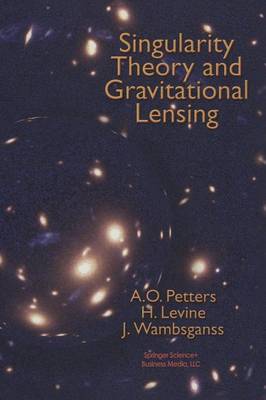Progress in Mathematical Physics
1 primary work • 2 total works
Book 21
Singularity Theory and Gravitational Lensing
by Arlie O. Petters, Harold Levine, and Joachim Wambsganss
This monograph is the first to develop a mathematical theory of gravitational lensing. The theory applies to any finite number of deflector planes and highlights the distinctions between single and multiple plane lensing. Introductory material in Parts I and II present historical highlights and the astrophysical aspects of the subject. Part III employs the ideas and results of singularity theory to put gravitational lensing on a rigorous mathematical foundation.
PREL 1100
Gravitational lensing occupies a central role in astrophysics and cosmology. It addresses some of the most pressing scientific issues: determining the nature of dark matter, constraining the cosmological constant and evolving dark energy, estimating Hubble’s constant, and testing Einstein’s general theory of relativity using the Galactic black hole. All these topics are treated in the book.
This unique monograph provides a rigorous, unified, exposition of gravitational lensing in spacetimes with matter (ordinary and dark matter), cosmological constant and evolving dark energy, and black holes (includes rotating black holes with accretion disks). Emphasis is placed on the rigorous analytical aspects of the subject, while at the same time introducing general relativity.
This work can be used as a text for a graduate level course or advanced undergraduate seminar in General Relativity or Gravitational Lensing. The work is interdisciplinary and should be of interest to researchers in mathematics, mathematical physics, astrophysics, cosmology, and general relativity.

